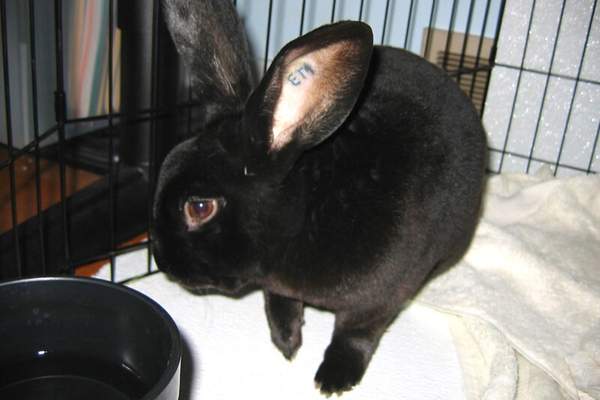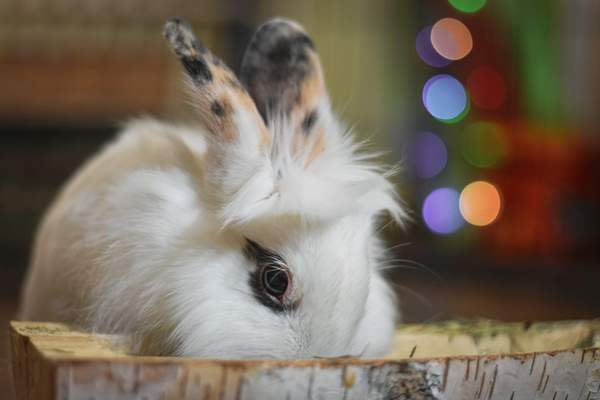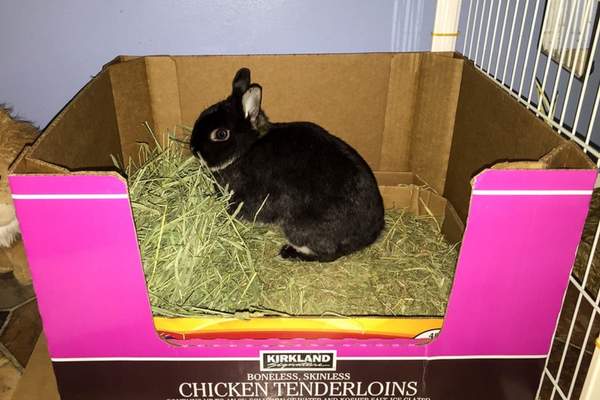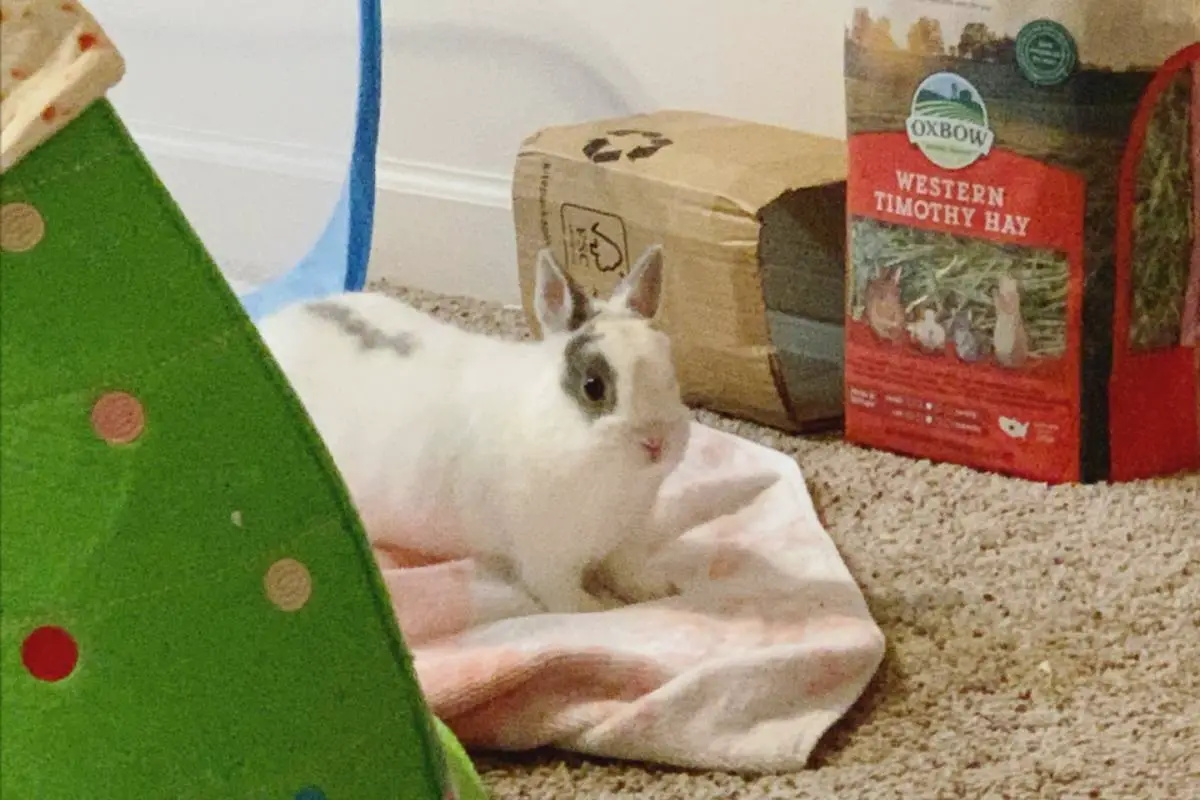Owning a rabbit, just like any pet, comes with a lot of ups and downs. One moment your bunny is being absolutely adorable while playing with you or taking a nap, the next he’s trying to chew your baseboards or is flinging his bedding all over your floor. However, all rabbit habits, good and bad, have some meaning behind them. It’s just a matter of decoding it.
So, why is my rabbit kicking his litter out? The quick and easy answer is that rabbits are surprisingly clean and tidy animals, and will aggressively remove soiled bedding or litter from their space. In short, your bunny is telling you that they need their litter changed.
In this article, you will learn more about rabbit’s grooming habits, what they like and dislike in their cages and litter boxes, as well as what you can do to make sure your bunny stays clean and healthy.
Cleanliness in Rabbits

Rabbits, whether wild or domestic, are very tidy animals. Some people who are not as familiar with bunnies might find this surprising, especially since rodents are somewhat notorious for their frequent bowel movements, but rabbits love to be clean!
They don’t like to poop and pee in the same place that they sleep and live, and are often fairly easily litterbox trained for this exact reason.
This desire to have a separate ‘bathroom’ actually serves an evolutionary purpose, as the smell of urine or feces can attract predators in the wild, so defecating in a different place than in their nest reduces their scent and makes it more difficult for animals like foxes or dogs to find them.
So, it makes sense that bunnies like to be clean: it keeps them safe! This is also why you see your bunny washing their face, paws, and ears so often, and why it’s important to keep an eye on your rabbit’s cleanliness routine: any sign of a dull or matted coat, stains from urine or feces, or stickiness around the eyes is not a good thing.
A dirty bunny is an unhappy bunny—but do NOT attempt to give your rabbit a bath yourself! This can be extremely dangerous for your rabbit, and may even send them into shock. Instead, get your pet to a vet as soon as you can, and ask for their help. Gently wiping your rabbit off with a damp cloth may be required, but a full bath is rarely, if ever, recommended.
Litter Box Behavior

If you’re sure that you’ve done everything you can to make your bunny’s litter box as perfect as can be and your rabbit still chooses to do its business elsewhere or throws its litter on the floor, then it could be that the litter box is dirty.
You may feel that you have just cleaned it—it’s not a particularly pleasant task—but your rabbit disagrees. It’s recommended that you should thoroughly clean your rabbit’s cage at least once a week and tidy it at least once a day, but litterboxes demand nearly daily cleaning, particularly if you have more than one rabbit, or if you use paper-based litter or if you use newspaper.
Here are some excellent tips for making the litter box cleaning process as quick and painless as possible:
– Make sure you establish a schedule: Having set days that are ‘litterbox days’ will make it less of a chore and more of something that you just do, like brushing your teeth. If your rabbit is kicking out litter, then you know that you need to increase the regularity of your cleanings, as your bunny is trying to clean up for itself—it’s not happy with the current situation.
– Keep a spare litter box: Changing the dirty litter box out for a spare, completely fresh box will keep your rabbit from urinating or defecating on your floor or furniture while you’re in the process of cleaning the first one. It will also give you more time to give the dirty box a good scrub.
– Be thorough: A cursory change of dirty litter for fresh litter is not going to do the trick. Rabbit urine is very stinky and sticky, and can build up on the plastic pan of the box. This will make the fresh litter dirty faster, and will make your rabbit unhappy.
Instead of scrubbing it by hand, try using the ‘spray’ option on a hose to make the process faster. Then, use a white vinegar and water solution to soak the pan. This kills bacteria and breaks down urine buildup.
Depending on how dirty the pan is and how frequently you clean it, a fifteen-minute soak might be enough. An hour-long soak might be necessary for a slightly longer cleaning schedule or an extra dirty box, while an all-day soak is needed for a serious deep clean. Be sure to rinse the box and give it a light scrubbing afterward!
– Sun-dry the box: if possible, letting the litter box sit out in the sun to dry is a great idea, as sunlight kills bacteria, it will give you a bit of a break, and a thorough air-drying will prevent moisture from lingering in the box and promoting mold or bacterial growth. If the sun isn’t an option, dry well with a towel, and then set up the box, or set it aside for the next time you need to change out the boxes.
Cleaning out a litter box with regularity and frequency is a lot of work and is not always pleasant, but it’s a necessary part of owning a rabbit. The first cleaning may have to be more thorough than the ones that follow, just to make sure that you start your new schedule of cleaning on a strong note.
However, not every cleaning after that will have to be as extensive! Keeping up with the task will make it far less difficult if you start strong, and it won’t take as long as you think it will once you’ve established a routine that works for you.
Other Issues With Litter

If you are totally sure that your bunny’s box is as clean and tidy as can be, then there might be an issue with the litter itself. Not only are bunnies surprisingly particular about where they decide to use the bathroom, they also care a lot about what they’re sitting in, because it is important to them that their litter box feels safe and comfortable— otherwise they won’t use it.
What you use in the box is also important because bunnies sometimes like to nibble on their litter, so some types of litter are not appropriate for rabbits and can even be dangerous to them, such as:
- Pine or cedar chip litters
- ‘Swheat Scoop’ litters
- Clay-based litter
- Clumping litters
- Corn-cob litter
All of these litters present possible health problems for your bunny, and should be avoided. Your rabbit may also dislike the way they feel or taste, and so will throw them out of their litter box as a form of protest. This can be irritating, but it’s much better than having your rabbit get sick as a result of eating corn cob or inhaling clay litter! Safer litters include:
- Paper litter
- Compressed sawdust pellets
- Wheatgrass-based litter pellets
- Oat or Alfalfa based litter pellets
- Newspapers
- Aspen-bark litters
These litters all are relatively safe for your bunny to ingest, but it’s always wise to keep an eye on your rabbit for any signs of illness, sudden weight gain or weight loss, or pain, as eating too much of any of these can be bad for your rabbit.
Doing more research into what is best for your particular breed is always a good idea if you aren’t entirely sure on which type to use. Every bunny is different, and requires a slightly different environment to thrive in. What works for one rabbit might not for another, and that’s perfectly normal!
Conclusion
Almost all rabbits have little quirks that make them special. However, some ‘quirks’ are signs of underlying issues. If your rabbit keeps kicking litter out of the tray, it’s likely time to reassess your litter box setup. Even though you feel that your cleaning schedule is sufficient, your rabbit feels otherwise.
Doing one thorough cleaning, followed by a regular and more frequent schedule of lighter cleanings will likely reduce this ‘litter kicking’ behavior in your rabbit, as your pet will be much happier with a cleaner box.
However, if this behavior continues despite all your best efforts of health and cleanliness, a chat with a vet or another expert in rabbit behavior may be in order: it’s always a good idea to ask for professional help if you can’t figure something out on your own.
Your rabbit kicking litter around is usually an easily resolved problem, and both you and your pet should be back to a more peaceful schedule with a little time and elbow grease.

